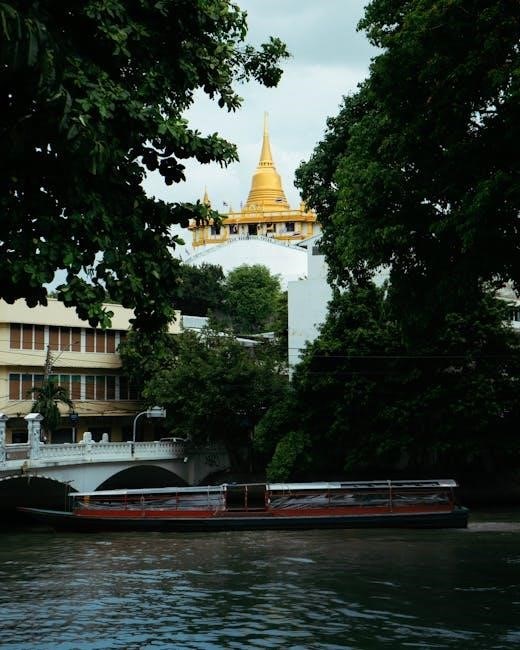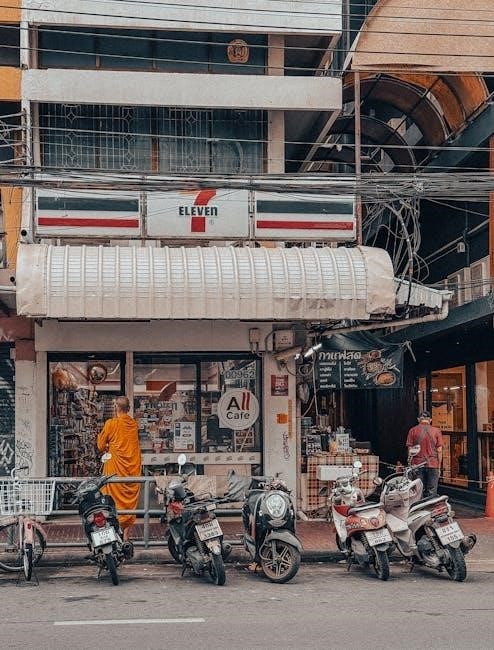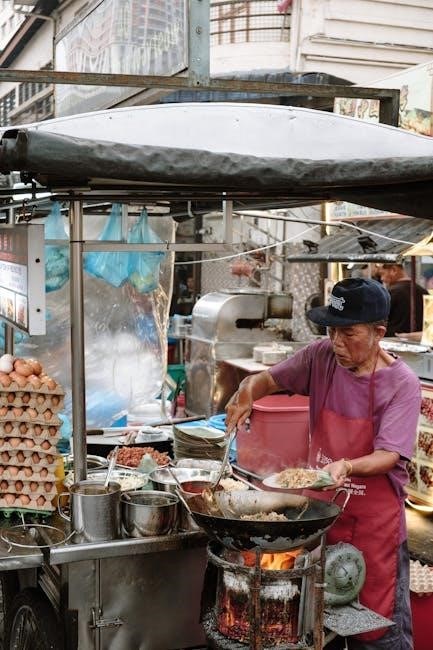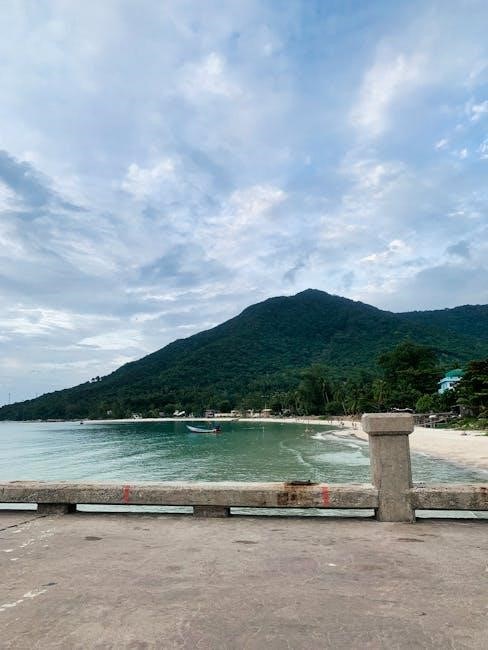Legal Status of Sex Work in Thailand
Prostitution in Thailand remains illegal under the 1996 Prevention and Suppression of Prostitution Act‚ but public solicitation is prohibited if done “openly and shamelessly” or causing a nuisance.
1.1 Current Laws Governing Prostitution
Prostitution in Thailand is governed by the Prevention and Suppression of Prostitution Act of 1996‚ which prohibits sex work and related activities. However‚ the law is inconsistently enforced‚ and prostitution remains widespread. Public solicitation is illegal if deemed “open and shameless” or causing a public nuisance. Brothels and pimping are also criminalized‚ with penalties including imprisonment and fines. Despite these laws‚ the sex industry thrives due to cultural acceptance and economic factors.
1.2 The Prevention and Suppression of Prostitution Act of 1996
The 1996 Act criminalizes prostitution‚ brothel ownership‚ and pimping‚ with penalties up to 10 years imprisonment and fines of 200‚000 baht. It targets both sex workers and clients‚ though enforcement is inconsistent due to corruption and economic reliance on the industry. The law also aims to protect minors‚ imposing harsher penalties for offenses involving those under 18. Despite its strict provisions‚ the Act has failed to curb prostitution‚ which remains prevalent and tolerated in practice.
1.3 Public Solicitation Laws and Their Enforcement
Public solicitation for prostitution is prohibited in Thailand if conducted “openly and shamelessly” or causing a public nuisance. Enforcement is inconsistent‚ with police often tolerating red-light districts like Pattaya and Bangkok due to economic interests. Despite strict penalties‚ including fines and imprisonment‚ street solicitation persists‚ highlighting the gap between legal prohibitions and practical enforcement. This duality reflects broader societal and economic factors influencing the sex industry’s visibility and operation.
Cultural Attitudes Toward Sex in Thailand
Thailand’s cultural attitudes toward sex are conservative yet paradoxically open-minded‚ contributing to the widespread acceptance of prostitution despite its illegal status‚ reflecting a complex societal duality.
2.1 Societal Perception of Prostitution
Thai society holds a mixed view of prostitution‚ with some seeing it as a necessary evil due to economic conditions‚ while others condemn it morally. Despite its illegality‚ prostitution is tolerated and accepted in many parts of the country‚ particularly in urban areas where it contributes significantly to the economy. This duality reflects Thailand’s complex cultural attitudes toward sexuality and work.
2.2 Religious and Traditional Influences on Sexuality
Thailand’s religious and traditional values significantly shape its approach to sexuality. Buddhism‚ the dominant religion‚ promotes modesty and moral behavior‚ yet Thailand’s culture remains relatively open-minded about sex compared to other countries. Traditional norms coexist with modern influences‚ creating a unique dynamic where prostitution‚ though illegal‚ is widely tolerated. This duality reflects a society balancing conservative values with practical realities‚ influenced by economic and cultural factors.
2.3 The Role of Sex Work in Thai Economy and Society
Sex work plays a significant role in Thailand’s economy‚ contributing billions of dollars annually. It employs vast numbers of workers‚ many driven by poverty and lack of education. The industry is deeply intertwined with tourism‚ attracting global clients. Despite its illegal status‚ sex work supports livelihoods and generates revenue‚ making it a complex economic and social pillar in Thai society‚ balancing economic necessity with legal and moral challenges.

Sex Tourism in Thailand
Thailand is a global hub for sex tourism‚ attracting millions with its vibrant nightlife and red-light districts‚ significantly contributing to the economy through adult entertainment.
3.1 Popular Red-Light Districts and Their Characteristics
Pattaya Walking Street‚ Soi Cowboy in Bangkok‚ and Bangla Road in Phuket are Thailand’s most iconic red-light districts. These areas are known for their vibrant nightlife‚ featuring go-go bars‚ nightclubs‚ and street performers. Pattaya is particularly famous for its neon-lit streets and diverse entertainment options‚ catering to both locals and tourists. Bangkok’s Soi Cowboy offers a more upscale experience‚ while Phuket’s Bangla Road is lively and popular with younger crowds. Each district has its unique charm‚ attracting millions annually.
3.2 Go-Go Bars and Their Role in the Sex Industry
Go-go bars are central to Thailand’s sex industry‚ offering live performances and direct interactions with dancers. These venues operate as hubs for both entertainment and commercial sex‚ with dancers often available for private services. Despite their popularity among tourists‚ go-go bars operate in a legal gray area‚ with ownership and management frequently linked to organized networks. They remain a significant driver of Thailand’s nightlife economy‚ blending culture and commerce in a unique yet controversial manner.
3.3 The Impact of Tourism on Thailand’s Sex Industry
Tourism significantly fuels Thailand’s sex industry‚ with visitors drawn to red-light districts and entertainment venues. The influx of foreign clients sustains demand‚ creating economic opportunities for sex workers. However‚ this also perpetuates exploitation and health risks‚ such as HIV and STI transmission. Tourism-driven demand often overshadows ethical concerns‚ complicating efforts to regulate or reform the industry. Despite legal restrictions‚ the sector thrives‚ highlighting a complex interplay of culture‚ economics‚ and morality.

LGBTQ+ Rights and Sexuality in Thailand
Thailand legalized same-sex marriage in 2025‚ becoming a pioneer in Southeast Asia. It is a relatively safe and welcoming destination for LGBTQ+ travelers despite some cultural challenges.
4.1 Legalization of Same-Sex Marriage in 2025
Thailand made history by legalizing same-sex marriage in January 2025‚ becoming the first Southeast Asian nation to grant equal marital rights. This landmark legislation allows same-sex couples to enjoy legal‚ financial‚ and medical benefits‚ marking a significant step toward equality. Hundreds of couples celebrated by tying the knot shortly after the law took effect‚ symbolizing a new era of acceptance and inclusivity in Thai society.
4;2 Challenges Faced by the LGBTQ+ Community

Despite Thailand’s progressive steps‚ the LGBTQ+ community faces challenges. Many laws remain gender-neutral‚ hindering rights like surrogacy for same-sex couples. Societal acceptance varies‚ with some areas being more conservative. Discrimination and stigma persist‚ particularly in rural regions‚ limiting opportunities and social inclusion. Advocacy groups continue to push for equality‚ but legal and cultural barriers remain significant obstacles for the LGBTQ+ community in achieving full acceptance and rights in Thai society.
4.3 Thailand as a Safe Haven for LGBTQ+ Travelers
Thailand is often seen as a safe haven for LGBTQ+ travelers due to its tolerant and accepting culture. Despite some conservative attitudes in rural areas‚ major cities like Bangkok and Phuket boast vibrant LGBTQ+ communities and nightlife. The legalization of same-sex marriage in 2025 further solidified Thailand’s reputation as a progressive destination in Southeast Asia. However‚ travelers should still exercise caution in less liberal regions to ensure a safe and enjoyable experience.

Safety and Precautions for Tourists
Tourists should avoid risky red-light districts and be cautious of scams. Practicing safe sex and using protection is crucial to ensure a safe and enjoyable experience.
5.1 Risks Associated with Engaging in Commercial Sex
Engaging in commercial sex in Thailand carries risks‚ including theft‚ assault‚ and exposure to HIV/STIs. Tourists may face legal issues due to the illegal status of prostitution‚ despite its prevalence. Many sex workers lack access to healthcare‚ increasing health risks. Additionally‚ scams and overcharging are common‚ particularly in areas like Pattaya. Prioritizing safety and precautions is essential to minimize these risks.
5.2 Areas to Avoid for Safety Reasons
Tourists should avoid areas like Pattaya and Jomtien‚ known for high crime rates and scams. These regions are heavily associated with the sex industry‚ increasing risks of theft‚ assault‚ and exploitation. While police presence exists‚ corruption can complicate safety. Staying in well-known tourist areas and avoiding secluded spots reduces risks. Engaging in illegal activities‚ even if tolerated‚ carries legal and personal safety risks.
5.3 Importance of Practicing Safe Sex
Practicing safe sex is crucial in Thailand to minimize risks of HIV‚ STIs‚ and unintended pregnancies. Using condoms consistently is essential‚ especially with multiple partners. Sex workers may carry infections‚ and unprotected sex heightens transmission chances. Regular health check-ups and HIV testing are recommended. Condoms are widely available‚ and their use is strongly advised to ensure personal and sexual health safety during any encounter.

Health Considerations
HIV and STIs pose significant risks in Thailand’s sex industry. Consistent condom use is crucial to prevent infections‚ and regular health check-ups are strongly recommended.
6.1 HIV and STI Risks in the Sex Industry
HIV and other sexually transmitted infections (STIs) remain significant health risks within Thailand’s sex industry. Despite awareness campaigns‚ inconsistent condom use and limited access to healthcare for sex workers contribute to high infection rates. Regular testing and education are critical to mitigating these risks. Clients and workers alike are urged to prioritize safe practices to reduce transmission and protect public health effectively.
6.2 Access to Healthcare for Sex Workers
Access to healthcare for sex workers in Thailand is challenging due to stigma and legal barriers. Many fear arrest or discrimination‚ deterring them from seeking medical care. While some NGOs provide STI testing and contraceptives‚ gaps remain in reaching all workers. Advocates push for inclusive policies to ensure equitable access to essential health services‚ addressing the unique needs of this vulnerable population effectively and compassionately.
6.4 The Role of Condom Use in Preventing STIs
Condom use is critical in preventing sexually transmitted infections (STIs) among sex workers and their clients. Consistent condom use significantly reduces the risk of HIV‚ gonorrhea‚ and chlamydia. Health organizations actively promote condom distribution and education in red-light districts. However‚ inconsistent use persists due to factors like client refusal or lack of access. Addressing these challenges is essential to enhance STI prevention efforts and protect the health of all parties involved in the sex industry.

Social and Economic Factors Driving the Sex Industry
Poverty‚ lack of education‚ and economic necessity drive many into sex work‚ often as a means of survival in Thailand’s challenging socioeconomic landscape.
7.1 Poverty and Lack of Education as Drivers
Poverty and limited educational opportunities are significant factors driving individuals into Thailand’s sex industry. Many‚ particularly women and marginalized groups‚ enter sex work due to economic necessity‚ lacking alternative employment opportunities. With limited access to education and vocational training‚ they often see sex work as a means of survival to support themselves and their families; This cycle perpetuates the industry’s growth and sustainability.
7.2 The Role of Police Corruption in Tolerating Prostitution
Police corruption plays a pivotal role in allowing Thailand’s sex industry to thrive. Despite prostitution being illegal‚ law enforcement often turns a blind eye in exchange for bribes‚ enabling brothels and red-light districts to operate openly. This corruption creates a protective umbrella for the industry‚ ensuring its persistence despite legal prohibitions. The collusion between authorities and sex work establishments underscores the systemic challenges in enforcing anti-prostitution laws effectively.
7.3 Economic Dependence on the Sex Industry
Thailand’s economy is significantly influenced by the sex industry‚ which generates billions of dollars annually. The industry supports numerous jobs‚ from sex workers to support staff in bars‚ hotels‚ and entertainment venues. Many rural families rely on income sent by relatives working in the sex trade‚ making it a vital part of the country’s informal economy. This economic dependence creates a complex dynamic where the industry persists despite its illegal status.
Human Rights and Advocacy for Sex Workers
Advocacy groups‚ including international organizations‚ are pushing for the decriminalization of sex work to protect workers’ rights and improve their access to social and health services.
8.1 Efforts to Decriminalize Sex Work
Local and international organizations are actively campaigning to decriminalize sex work in Thailand‚ aiming to protect workers’ rights and improve their access to healthcare and legal protections. Advocates argue that decriminalization would reduce exploitation and allow sex workers to operate safely without fear of arrest. These efforts align with global trends promoting human rights and labor rights for all workers‚ including those in the sex industry.
8.2 Challenges in Protecting Sex Workers’ Rights
Protecting sex workers’ rights in Thailand faces significant challenges‚ including systemic corruption‚ societal stigma‚ and lack of political will. Despite efforts to decriminalize sex work‚ many workers remain vulnerable to exploitation and abuse. Police corruption often prevents legal protections from being enforced‚ while cultural attitudes perpetuate discrimination. Additionally‚ the informal nature of the industry makes it difficult to implement policies that ensure fair labor rights and access to justice for sex workers.
8.3 The Role of International Organizations in Advocacy
International organizations play a crucial role in advocating for sex workers’ rights in Thailand. Groups like the International Sex Workers Union and human rights NGOs have pressured the government to decriminalize sex work and improve working conditions. These organizations provide legal support‚ raise awareness about exploitation‚ and push for policy reforms. Their efforts aim to reduce stigma and ensure sex workers access to healthcare‚ social security‚ and legal protections‚ fostering a safer and more equitable environment for all workers.

The Future of Prostitution in Thailand
The future of prostitution in Thailand remains uncertain‚ with growing calls for legalization and regulation to improve sex workers’ rights and safety‚ despite ongoing political and societal challenges.
9.1 Calls for Legalization and Regulation
Advocates argue that legalizing and regulating sex work in Thailand would enhance safety‚ reduce exploitation‚ and provide legal protections for workers. This approach could also generate tax revenue and streamline public health initiatives. However‚ opposition remains strong‚ with critics citing cultural and moral concerns. The debate continues as policymakers weigh the potential benefits against societal resistance‚ aiming to balance economic realities with ethical considerations.
9.2 Ongoing Debates and Political Obstacles
Despite calls for reform‚ legalizing sex work in Thailand faces significant political and cultural challenges. Conservative elements in society and religious influences oppose decriminalization‚ citing moral concerns. The government has historically avoided direct confrontation with the issue due to its sensitivity. Meanwhile‚ anti-prostitution groups and human rights organizations clash over the best approach to protect workers while addressing exploitation. Political consensus remains elusive‚ hindering progress toward meaningful legislative change.
9.3 Potential Impact of Legalization on the Industry
Legalizing sex work in Thailand could lead to improved regulation‚ enhanced worker safety‚ and better access to healthcare. It might reduce corruption and allow for taxation of the industry‚ benefiting the economy. However‚ concerns exist about increased exploitation and the potential for the industry to expand uncontrollably. Balancing protections for workers with societal norms remains a critical challenge in shaping the future of Thailand’s sex industry.
